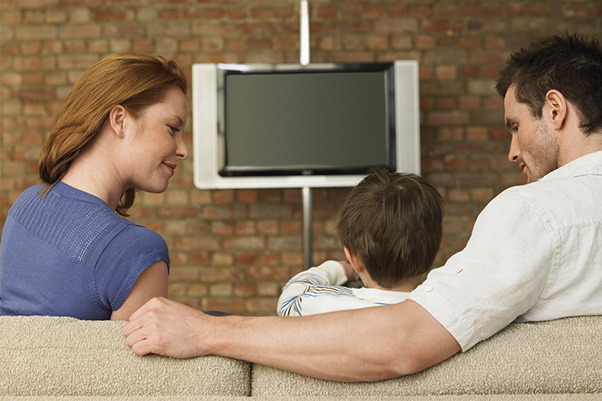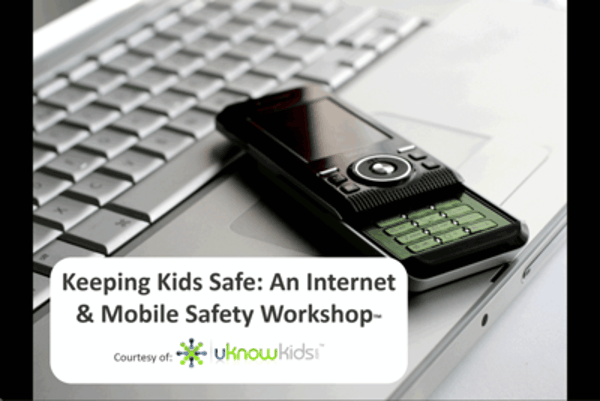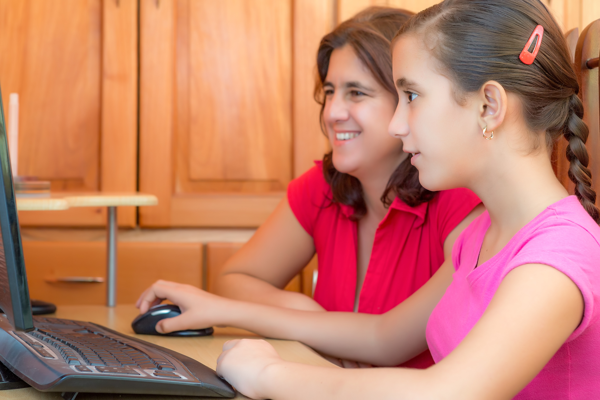The onslaught of digital duress may be stripping back the fabric of your family. It is no secret that in this age of digital everything, digital parenting has leapfrogged over so many other more traditional means of parenting. Although digital parenting is a necessary adaptation, it's important for families to strengthen communication before technology.
Read More »Digital Parenting: 11 Facts About Cyberbullying
Cyberbullying is defined as a young person tormenting, threatening, harassing, or embarrassing another young person using the Internet or other technologies, like cell phones. The psychological and emotional outcomes of cyberbullying are similar to those of real-life bullying. The difference is, real-life bullying often ends when school ends. For cyberbullying, there is no escape. And, it’s getting worse. Read on to get the facts.
6 Requirements for Managing Peer Pressure Among Kids/Teens
Peer pressure can be extremely hard to deal with for kids and teens. It becomes increasingly difficult without the support of their parents. When it comes to managing peer pressure among kids/teens, there are things that you should do, and things that you must do. Here are six such "musts" for dealing with peer pressure:
-
Talk to your child about the dangers of drugs, alcohol and sex: Talking to your child opens up a dialogue that can be very important. If your child feels safe discussing these difficult topics with you, there is a greater chance that they will come to you if they are curious about trying them.
Teaching Children About Internet Security Right From The Start
There is never a time too early in the life of a child to start thinking about Internet security. Children of younger and younger ages are starting to get a glimpse into the world of the Internet, and many are potentially at risk if they are not informed of what they should and should not do.
Have A Conversation
Before you ever get into the technical aspects of what you can do to keep your child safe online, it is a good idea to simply have a conversation with them. You can explain to them the steps to take if they are confronted by someone online that they do not know.
Read More »How To Approach Punishing Your Teen For a Digital Slip-Up
From catching your teen sexting, to finding out that they violated your phone contract, digital slip-ups are never fun to deal with. It is not surprising that teens and parents often experience power struggles over digital rules and privileges. Teens are often given such high responsibility with technology at such young ages, that it is natural that there are going to be some problems. Digital rule-breaking is still a relatively new avenue of parenting that requires specific attention and action.
Read More »5 Tips for Mobile and Internet Child Safety
Children now spend more time with the media via Internet and mobile technology than they do with their family, in school, or sleeping.
A nationwide survey conducted by the Kaiser Family Foundation found that in just five years, media use has increased from 6 ½ to nearly 7 ½ hours a day in children between the ages of 8 and 18. As if this weren’t frightening enough, children also tend to be master multitaskers, using as many as three technological tools at once to browse through their digital lives.
Read More »Teaching Kids and Teens Media Smarts During Breaking News
With constant breaking news streaming in through media outlets and social networks, kids and teens need to know how to digest and decipher news reports. Teach them the basics of how to filter out what is accurate and important in the news world. We found a fabulous article on the subject originally published on Common Sense Media and written by Sierra Filucci. Please check it out.
When big news breaks, it's easy to get caught up in following the news online. But while the Internet -- from major news sites to Twitter -- can be a valuable place to find useful information, it can also be the source of misinformation. Helping kids and teens understand the news and how to separate fact from fiction is an important job for parents and educators.
Here's some advice parents can offer kids and teens who consume the news:
Remember, breaking news is often wrong. In the rush to cover stories, reporters make mistakes, officials don't always have correct information, and tidbits that sound plausible often get passed around before anyone can check for accuracy. One Texas TV station reported through closed captioning that Zooey Deschanel was one of the accused Boston Marathon bombers!
Read More »Digital Parenting is Important for Teens, Whether They Like it Or Not
Digital parenting is one of those topics that can make families uncomfortable. No teenager wants to feel like Mom and Dad are sticking their noses into his or her personal business, and no parent wants to keep their kids from making the most of the advantages the internet can provide.
It’s important to know what your kids are doing on the internet: it can be a tremendous tool for school and for social interaction. It also opens them up to a whole range of possible dangers including cyberbullying, child predators, and inappropriate content. How do parents keep their kids from undue risk without stifling their independence?
Read More »Establishing That the Internet is a Privilege, Not a Right
Something that parents need to establish with their children early is that using the Internet is a privilege, not a right. This is important because if kids get too accustomed to and reliant on the Internet, it will be harder to end their privilege to it if they go against the rules.
In order to practice digital parenting, there has to be set rules that children understand and abide by. These rules vary on a case-by-case basis, but they should require open conversation between children and their parents concerning their activity on the Internet. When the rules are set, parents have to be ready to remove the Internet privilege if their child breaks the rules. It's not just to keep children safe from cyber threats, but also a life-long lesson that they can't take shortcuts and cheat the system.
Read More »You're Invited: The Internet & Mobile Safety Workshop for Parents
Today’s children represent the first generation to grow up entirely in a digital world. They have spent their entire lives using computers, video games, webcams, digital music players, mobile phones, instant messaging apps and everything else the digital world has to offer. In a sense, our kids are all “native speakers” of a digital language.
They are "Digital Natives". So what does that make this generation of parents?
Those of us who were not born into a digital world are, and always will be, "Digital Immigrants" and we are now in the process of learning a new language while also trying to raise our kids and keep them safe.
Read More »If Your Kids Use iPhones or iPads, Help Has Arrived: uKnowKids for Apple
In the past few years, iPhone and iPad usage with kids has expanded tenfold. In order to keep up with these changes, uKnowKids is launching a new product specifically designed to help parents whose kids are using iPhone, iPads, iTouches and Macs. It is called the uKnowKids for Apple, and we plan to launch it into public beta in April.
Big iPhone and iPad News
You can pre-order to get early access to the uKnowKids for Apple today!
Note... We are still working on a final name the product, so "uKnowKids for Apple" may go through a name change in the next few weeks or months, but you get the idea :)
With the uKnowKids for Apple, parents can gain dramatically better transparency into your child's iPhone activities than any other solution on the market today. Let's take a look at some of the new features.
View iMessages (Text Messages & Picture Messages):
We all know that keeping tabs on text and picture messages is helpful for parents who are trying to educate and coach their kids on how to use technology safely and responsibly. With the uKnowKids for Apple, parents are able to view their teen's incoming and outgoing iOS text messages (SMS) and picture messages (MMS)... iMessages... via their iPhones, iPads, iTouches, and Mac computers. Additionally, the feature enables uKnowKids customers to review stored photos. Keeping an eye on these interactions can help parents ensure that new phone users aren't getting involved in peer pressure, sexting or other digital dangers.
Read More »Mobile And Internet Child Safety: They Are One In The Same
If you think that your child is absolutely safe on the Internet at all times, you are probably fooling yourself. This is particularly true if you have not taken the time to have a conversation with your child about the potential dangers of the Internet. It is important to consider both mobile and Internet child safety these days.
Why Mobile Matters Just As Much
Pew Research conducted a poll asking teens what kind of phone they have. They found that 37% of teens ages 12 to 17 indicate that they own a smartphone. This means that almost half of teens can chat, meet people, buy things, and get involved in other situations online that could be potentially dangerous to them.
Read More »Digital Parenting: Being A Good Parent For Your Child Online
It is undoubtedly true that most all parents want to be good to their children. They want to protect them and watch them grow up and flourish. If possible, they will keep them away from anything or anyone that might do them harm. As such, digital parenting is a part of their duties.
Online Threats
Online threats come in a variety of forms from bullying by peers all the way up to sexual harassment, intimidation, and more. Taking a look at some of the figures from bullyingstatistics.org can be a real eye opener:
-
Over half of adolescents and teens have been bullied online, and about the same number have engaged in cyberbullying
Keep Your Family on Schedule with Smart Lighting
While there are many valid concerns regarding disassociation parenting, facilitated by the influx of digital tools into our lives, there is one area where advances in technology can be incredibly beneficial to families: the smart home, and in particular, smart lighting.
Our family was fortunate enough to receive a Philips Hue starter kit around Christmas time, and to say that it has been a life changer is no exaggeration.
Read More »Digital Parenting: The 24-Hour Battle
Parenting your children is something that takes skill and grace. It is sometimes a struggle when they want to resist you and your expectations of them. This is made even harder for some parents in the area of digital parenting.
When asked to set rules for their children and monitor those rules in the online realm, some parents feel helpless. However, there are a few things you can do to keep your children safe.
1. Have A Frank Conversation With Them
It all starts with talking. Many parents believe that the things that they say go in one ear and out the other with their children, but this is really not true. Your child does hear and understand what you are saying. If they choose to listen to you or not largely has to do with what enforcement tactics you use to make them obey.
Read More »How to Organize Your Family's Tech Cords and Accessories
After the holidays, it's fairly likely that you have new gadgets and devices to play with and to keep charged. In our plugged-in culture (we're still not quite there on wireless charging!), it's easy to feel buried in electrical cords for the bazillion different types of technology we own.
From cell phones to tablets and everything in between, it can be overwhelming. When you (or your child) needs to charge your phone or the latest e-reader, where's the charger? They all look the same, but unfortunately, they're not all universal. It can be a headache and cause a great deal of frustration (not to mention that when you find the correct charger, it's in a knot with the other hundred cords).
To help reduce the stress of searching for power cords, chargers and cables this holiday season and beyond, there are a few simple solutions. Once a system is in place, you'll find that sought-after power cord in seconds, and you won't have to enlist an army of helpers to untangle or look under sofa cushions.
Tame the Cord Dragon
To begin, sort your cords into categories. Round up the family and have everyone collect all the cords for each gadget. You'll be surprised at the pile that you find! Popular ones for most homes include: iPhone, Android, HTML, e-reader, tablets, cameras, etc.
Read More »3 Fundamental Steps to Take in Digital Parenting
There is no use in trying to jump into digital parenting all at one time. Rather, a step-by-step approach is preferred and more successful over time. Following a set of steps allows your child and you to have a good understand with one another and hopefully work together to have a safe time on the Internet.
1. Have a Conversation With Your Child
Showing an interest in what your child is doing online is a great basic first step. You want to show them that you care about whatever the latest app is or perhaps what websites they like to visit. You may be surprised by how much your child is actually willing to share with you on this topic. It opens the door to deeper conversations about Internet safety.
Read More »Digital Parenting: How To Proactively Enforce Your Rules
There is absolutely no reason why digital parenting has to be something that your children despise. When used correctly, digital parenting techniques enable you to set rules and boundaries for your children that they will respect. It takes time, but learning the right principles to use greatly improves outcomes.
It Is Not About Outsmarting Your Children
First things first: good luck trying to stay one step ahead of your children, particularly when technology is involved! Thecybersafetylady.com.au has a better definition of what parents should be doing to better
Read More »3 Crucial Internet Safety Tips to Teach Your Kids
Now that we live in the digital age, chances are that your children will use the Internet throughout their lives both for work and play. Here are a few things you should teach them early to ensure good Internet security.
1. Keep Personal Details Secret Online
It’s important for children to learn the need for secrecy when browsing the web. Younger children especially tend to be automatically trusting of anyone they meet, especially in cyberspace. They need to understand to never give out their real name, their phone number, their address, or any other personal information on the Internet.
2. Never Meet Up With Strangers
Read More »7 Simple Steps Parents Can Take To Enforce Mobile and Internet Safety
Times are quickly changing. Kids are facing a world with more access to global information and communication thanks to a number of technological advances and the development of various social networking sites and app connections. Cyberspace has afforded today's youth with the availability of digital communication and sharing, among other activities.
There are obviously many pros and cons concerning these advances, but the facts speak for themselves; youth use computers and mobile phones more today than they have ever done and at increasingly younger age ranges. Discussions on mobile and Internet safety are important in ensuring a safe and positive experience for your child and others.
Check out these 7 simple things you can do as a parent to teach and enforce Internet and mobile safety:
-
Set tech time limits. By setting limits to the amount of time your child spends on the phone or computer, you are also setting boundaries. Multiple studies show that too much time spent with technology can lead to poor social, physical, and mental health. Limiting cyber time keeps a child from becoming too involved online and can also enable them to develop a more balanced relationship with technology in the future. You may consider implementing tech-free zones in your house, which establish clear times and places where tech is permitted to be used.





















